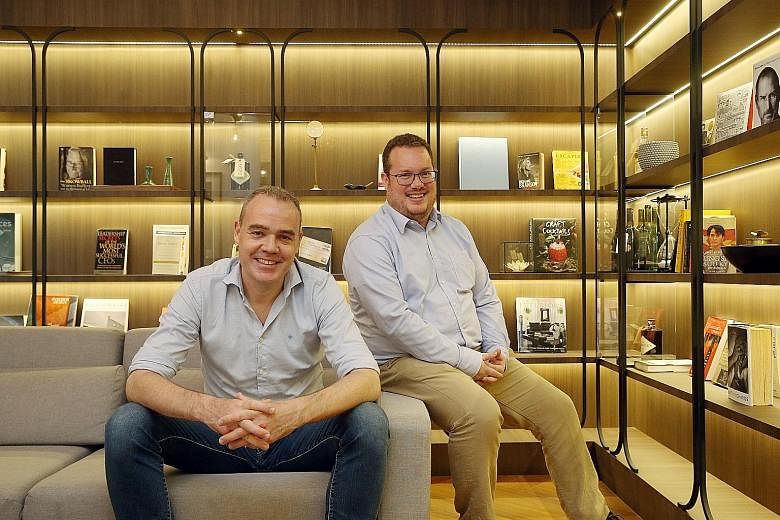Q How did you get started as angel investors?
Mr Blakey My brother and I decided to become full-time angel investors after working on some start-ups together back in Britain.
We were one of the first - if not the first - to do this there.
I thought Asia would be an interesting opportunity, especially since one of my portfolio companies wanted to expand to Singapore to access the Asian market.
I moved here just over four years ago and started coming across cutting-edge technology, with opportunities that have global potential.
Mr Klippgen I have been in the tech scene since the early 1990s, in Silicon Valley as well as Europe and Singapore.
I have lived here since 2003.
I did an MBA after selling my company to Yahoo. I went to Insead, did the first half of my MBA in France, moved here for the second half and decided to stay. I came to Singapore more for the lifestyle, because I had young children.
I was probably the first non-Singaporean angel investor in Singapore.
When I started investing, I realised it was actually an opportune time to move here because the start-up ecosystem in this region was just getting started.
Q How did you start working together?
Mr Blakey We met through (Singapore's first start-up accelerator) JFDI at Blk71.
We realised we have a very similar approach to investing - investing in very few companies, working very closely with them and supporting them as much as we can.
We ended up doing a few deals together and realised that we should team up in a more formal way, which is how Cocoon came about.
Mr Klippgen Michael and I have done close to 60 deals between us, out of which 30 have been in Singapore, since 2000. Not many angel investors live off their investing - a lot of angel investors invest because they already made money from other sources.
But we've been professional full-time investors. That led us to think we should start a company. Mr Blakey We have a similar approach but our skill sets are quite different. We both have strong opinions, so if I want to take anything to Will, I have to know my stuff. With his technical background, he can also look at that side of things better than I can.
Q How did you structure Cocoon differently from traditional venture capital firms and why?
Mr Blakey A lot of investors we work with, especially family offices, do not want to write small cheques and spend time with start-ups. They're interested in cheque sizes of $500,000 to $5 million.
But they seldom get much deal flow unless the deal has been passed by many venture capitalists or its value is highly inflated. So we went to them and said we won't charge any management fees.
When the portfolio companies need later rounds of funding, Cocoon's investors are given the right to invest more. We're now leveraging on a fund size of about $10 million which will be deployed over the next two years. We're looking to do 10 to 12 deals.
Will and I are the third and fourth largest investors in the fund.
Q How do you work with your portfolio companies?
Mr Klippgen Some people think investing in start-ups is like gambling, like going to a casino.
To a certain extent it is, but you can also improve your odds tremendously if you focus on helping the start-ups.
We spend a lot of hands-on time with the start-ups - everything from making PowerPoint presentations to team building, management skills and tech consulting.
We also apply similar methods to our own operations - we try to be very lean with almost no overheads. Instead of hiring an assistant, we use Evie, the robotic personal assistant developed by mimetic.ai. We also decided that we won't use paper. We accept only share certificates and bank statements in paper.
Everything else is done online and all agreements are signed online.
Mr Blakey For a lot of early-stage companies, about 50 per cent of the money they raise is not used efficiently.
There's always an element of trial and error, but we try to reduce that wastage by about 25 per cent. We also use our network and the network that our investors bring - here, in Europe and the United States.
For instance, one of our investors is Zalora co-founder and former managing director Magnus Grimeland, so we can go to him on anything e-commerce related and he can give advice on what the market would find useful.
Q What are your thoughts on the start-up scene here and its growth prospects?
Mr Blakey The angel investor scene is still very much in its infancy.
I would like to see more networks and syndicates being formed, and not just by the Government.
Since I got here, I've definitely seen the quality of entrepreneurs and products, both in Singapore and the region, improve. There's a lot of impatience out there, with people asking where the big exits are.
In other ecosystems like Britain, people had the same questions some time ago, in 2007 or 2008.
These companies take time to build, something like 10 years.
Some companies I've seen here have the potential to become that, but it takes time.


